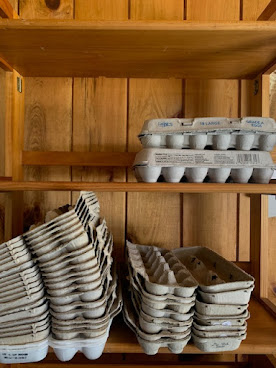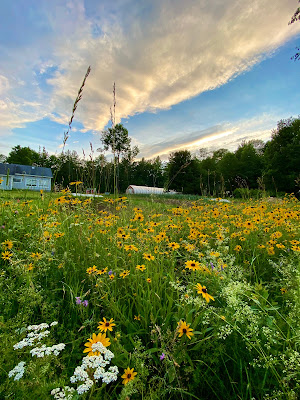10 ways to farm/garden in a more environmentally friendly way!
If gardening for you is a way to reduce your carbon footprint, then perhaps also consider these 10 ways to garden in a more eco friendly way!!
1. Grow perennials!
Perennials regrow every year so you don't have to invest in new seeds each new growing season!! Examples include: bunching onions, sorrel, rhubarb, berry bushes, radicchio, kale etc.
2. Reuse water!
At CCF we reuse the water that we wash our veggies in by directing it towards our tomato greenhouse via plastic tubing. Also, try using a rain barrel!
3. Repurpose bottles and jars!
Have a lot of extra mason jars lying around?? You can use these to plant seedlings or for watering plants.
4. Compost
Take advantage of the decomposition of your food scraps! Just make sure to put a clothespin on your nose when you do..
5. Reuse planting flats and cells
At CCF we reuse all of our planting cells and planting flats for our seedlings. Just give your flats and cells a quick rinse before using them again!
6. Don't water your plants every day
Believe it or not some plants don't need to be watered every day. Make sure to research the needs of the plants in your garden before overwatering or under watering them..
7. Crop rotation
Track and plan where you plant certain crops in a notebook or in a google spreadsheet. This way you can have a rotation of crops that renew necessary nutrients to the soil that may have been lost in the presence of other crops.
8. Stay away from chemicals
While certain chemicals can make your plants grow faster or keep insects away, they can also seep into your water supply and offset the equilibrium of other organisms in the nearby environment. Instead, use fertilizers like Fish Emulsion, manure, bone meal, and egg shells in replacement of synthetic fertilizers.
9. Birds! Birds! More birds!!
Encourage birds to your garden by hanging up bird feeders in your garden. If you don't want to spend money on a bird feeder you can coat a pine cone in peanut butter, sprinkle it with bird seed and hang it up with string in your garden. By attracting more birds you will have fewer insect pests, like caterpillars and grubs in your garden.
10. Grow native plants
Native plants are more likely to survive in your garden than nonnative plants. Also they require less work than other plants! Woohoo!
While these 10 tips may appear to be fairly small and insignificant, they add up! Environmental change won't happen over night, but its our job to get the ball rolling. So get to it!!!



Comments
Post a Comment